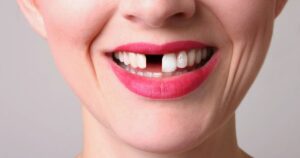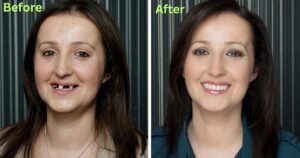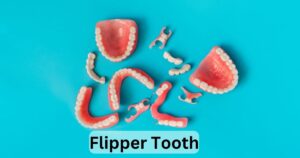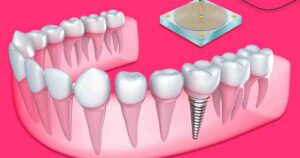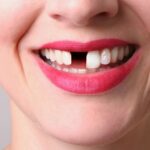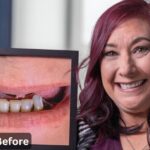Dentures can cause jaw and ear pain when they don’t fit properly. This discomfort arises from an improper fit, emphasizing the need for a well-adjusted set of dentures to avoid such pains.
Have you ever wondered if your dentures could be causing that nagging jaw and ear pain? Well, you’re not alone. Many people experience discomfort, and the answer to the question Can Dentures Cause Jaw and Ear Pain? might surprise you. In this quick read, we’ll uncover the reasons behind this common issue and explore how to find relief.
Dentures, though a solution to missing teeth, can sometimes lead to discomfort. The ill-fitting dentures might cause jaw and ear pain. It’s vital to ensure your dentures fit right to avoid these aches. Now, let’s delve into the details of how dentures can bring about such discomfort and what you can do to prevent it.
What Causes Dentures to Become Ill-Fitting?
Dentures may become ill-fitting due to changes in the mouth’s shape over time. When teeth are lost, the jawbone can shrink, affecting the fit. Additionally, poor maintenance can lead to wear and tear, making dentures loose.
Eating hard or sticky foods can also damage dentures, causing them to lose their fit. Regular dental check-ups are essential to address these issues and ensure your dentures stay well-fitted and comfortable.
| Type of Denture Pain | Description | Solutions |
| Sore Spots | Dentures rub against gums, causing discomfort. | Regular adjustments can alleviate this discomfort. |
| Pressure Pain | Discomfort from an improper fit. | Proper fit is crucial, and your dentist can help make necessary adjustments. |
| Imbalanced Pressure | Uneven pressure distribution leads to discomfort. | Ensure dentures are well-balanced for a more comfortable experience. |
| Sharp Bone Pain | Sharp pain at bony areas of the mouth due to pressure points. | Dentist can adjust dentures to relieve this pain. |
| Burning Mouth Syndrome | A burning or tingling sensation in the mouth, often associated with wearing dentures. | Consult a healthcare professional for proper diagnosis and management. |
What Issues Can Develop?
Several issues can develop with dentures. These include sore spots, difficulty speaking, and trouble eating. Using a wax bite for dentures can help identify areas where your dentures may be causing discomfort. Poorly fitted dentures might also lead to infections or sores in the mouth. It’s crucial to address these concerns promptly to ensure a comfortable and functional experience with your dentures.
Blisters: Dentures that don’t fit properly can create friction against the soft tissues in your mouth, leading to painful blisters. These blisters can make wearing dentures an uncomfortable experience.
Ear Pain: Poorly fitted dentures can exert pressure on the jaw, which can radiate pain to the ears. This discomfort can range from mild to severe, affecting your overall well-being.
Trouble Eating: When dentures don’t fit snugly, they can make chewing and biting difficult. This can lead to challenges in maintaining a balanced diet, potentially affecting your nutrition.
Uneven Bite: Ill-fitting dentures can cause an uneven bite, which may result in jaw pain and discomfort. It’s important to correct this issue to prevent further complications.
Atrophy of the Jawbone: Over time, if dentures don’t properly support the jaw, it can lead to atrophy or the loss of bone density in the jaw. This can further exacerbate fit and comfort issues with dentures and impact your facial structure.
Addressing these concerns promptly with the help of a dentist is essential to ensure your dentures provide a comfortable and functional solution for missing teeth.
Can New Dentures Cause Jaw Pain?
New dentures, like any change in your oral routine, can sometimes lead to jaw pain. This discomfort may arise as your mouth adjusts to the new appliance. It’s essential to give your jaw some time to adapt to the dentures, and in most cases, the discomfort will subside.
If the jaw pain persists, it’s a good idea to consult your dentist. They can ensure that the dentures are properly fitted and make any necessary adjustments. Remember, while new dentures may cause initial discomfort, they should not lead to long-term jaw pain if they are correctly designed and fitted to your mouth.
Cannot Wearing Dentures Cause TMJ
When you don’t wear your dentures as prescribed, it could lead to some problems. TMJ, or temporomandibular joint disorder, might be one of them. This condition affects your jaw, and neglecting your dentures may contribute to its development.
Properly fitted dentures are crucial for your oral health. If you avoid wearing them regularly, you risk straining your jaw, potentially causing TMJ discomfort. So, remember to follow your dentist’s recommendations to keep your smile and jaw in good shape.
Do Dentures Cause Jaw Bone Loss?
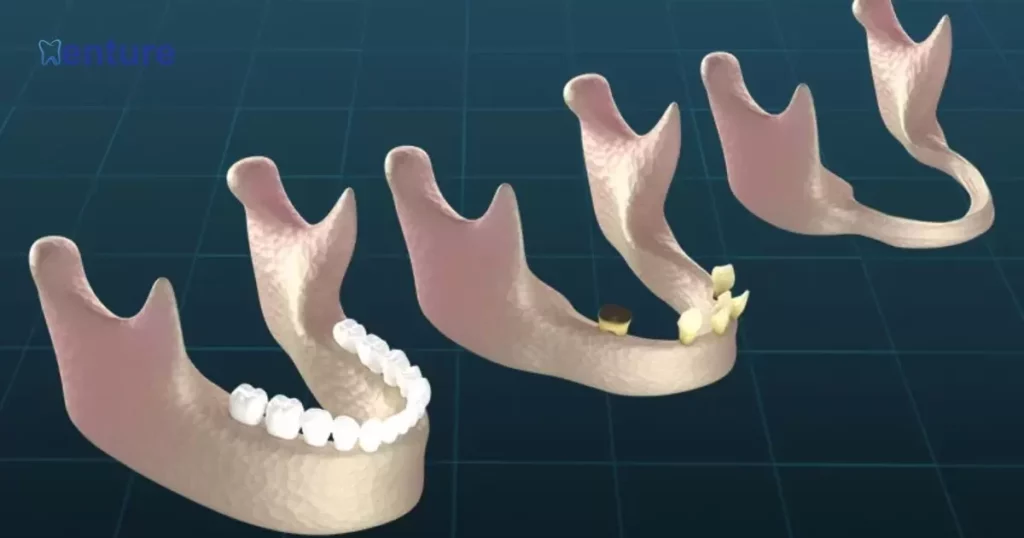
Wearing dentures for an extended period can lead to a concern – jaw bone loss. This happens because dentures don’t provide the same stimulation to the jawbone as natural teeth do. Without this stimulation, the bone can gradually shrink, causing a change in the way your dentures fit.
The good news is, you can take steps to minimize jaw bone loss. Regular check-ups with your dentist and considering dental implants can help maintain jawbone health. So, while dentures can contribute to jaw bone loss, with proper care and attention, you can keep your smile and jaw healthy.
5 Types of Denture Pain
Denture pain comes in various forms. One common type is sore spots, where the dentures rub against your gums. Another type is pressure pain, often caused by an improper fit. Then, there’s the pain of adjustment as your mouth gets used to the dentures.
Loose, Rubbing Dentures
These occur when your dentures don’t fit snugly, causing friction and sore spots on your gums. Regular adjustments can alleviate this discomfort.
Tight, Pinching Dentures
Dentures that are too tight can pinch your gums, leading to pain. A proper fit is crucial, and your dentist can help make necessary adjustments.
Imbalanced Pressure
Uneven pressure distribution can lead to discomfort. It’s important to ensure your dentures are well-balanced for a more comfortable experience.
Sharp Bone Pain
Sometimes, you may feel sharp pain at the bony areas of your mouth due to pressure points. Your dentist can adjust your dentures to relieve this pain.
Burning Mouth Syndrome
This condition can cause a burning or tingling sensation in the mouth, often associated with wearing dentures. Consulting a healthcare professional is advisable for proper diagnosis and management.
FAQ’s
How Do I Know if My Dentures Are Causing Pain?
If you experience persistent pain or soreness in your jaw and ears, it’s a sign that your dentures might be the culprit.
What Causes Jaw and Ear Pain from Dentures?
Pain can result from dentures that don’t fit properly, causing pressure points, friction, or uneven distribution of force.
Can This Pain Be Prevented?
Yes, regular dental check-ups and adjustments can help ensure your dentures fit well, reducing the likelihood of pain.
Conclusion
The various types of denture pain, including issues like Dentures Cause Jaw And Ear Pain, are vital to maintaining a comfortable denture-wearing experience. Whether it’s loose, rubbing dentures, tight, pinching dentures, or imbalanced pressure causing discomfort, regular visits to your dentist for adjustments are key.
Experiencing embarrassment while wearing dentures is a common emotion, but it’s essential to recognize that many people use dentures as a solution to dental challenges. Don’t hesitate to consult your dentist if you ever experience pain or discomfort.

